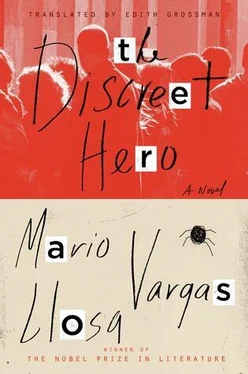He was silent for a while, staring into his empty cocktail glass, and Lituma thought he’d begin to whimper again. But he didn’t. Instead, with his head down, not looking at them, as if speaking not to them but to himself, the small man in his close-fitting, ash-colored jacket and vest began to recall his father. Blue flies buzzed in circles around their heads, and in the distance they could hear a heated argument between two men over a traffic accident. Felícito spoke in a hesitant way, searching for the words that would give the story he was telling proper weight and allowing himself at times to be overcome by emotion. Lituma and Captain Silva soon realized that the tenant farmer Aliño Yanaqué, from the Hacienda Yapatera, in Chulucanas, was the person Felícito had loved most in his life. And not only because the same blood ran in their veins but because thanks to his father, he’d been able to lift himself out of poverty, or rather, out of the wretchedness in which he was born and spent his childhood — a wretchedness they couldn’t even imagine — to become a businessman, the owner of a large fleet of cars, trucks, and buses, an accredited transport company that made his humble family name shine. He’d earned people’s respect; those who knew him also knew he was trustworthy and honorable. He’d been able to give his children a good education, a decent life, a profession, and would leave them Narihualá Transport, a business both customers and competitors thought well of. All this was due more to the sacrifices of Aliño Yanaqué than to his own efforts. He’d been not only his father but also his mother and his family, because Felícito had never known the woman who brought him into the world or any other relative. He didn’t even know why he’d been born in Yapatera, a village of blacks and mulattoes where the Yanaqués, being Europeans, that is cholos , seemed like foreigners. They led an isolated life, because the dark-skinned people of Yapatera didn’t make friends with Aliño and his son. Either because they had no family or because his father didn’t want Felícito to know who his aunts and uncles and cousins were or where they could be found, they’d always lived alone. He didn’t remember it, he was very young when it happened, but he knew that soon after he was born his mother ran off, who knows where or with whom. She never came back. For as long as he could remember his father had worked like a mule, on the tiny farm the boss gave him and on the boss’s hacienda, with no Sundays or holidays off, every day of the week and every month of the year. Aliño Yanaqué spent everything he earned, which wasn’t much, so that Felícito could eat, go to school, have shoes and clothes, notebooks and pencils. Sometimes he gave him a toy for Christmas or a coin so he could buy a lollipop or taffy. He wasn’t one of those fathers always kissing and spoiling their children. He was frugal, austere, and never gave him a kiss or a hug or told him jokes to make him laugh. But he deprived himself of everything so his son wouldn’t be an illiterate tenant farmer when he grew up. Back then Yapatera didn’t even have a school. Felícito had to go from his house to the public school in Chulucanas, five kilometers each way, and he didn’t always find a kindly driver who’d let him climb into his truck and save him the walk. He didn’t recall ever missing a single day of school. He always got good grades. Since his father couldn’t read, he had to read his report card to him, and it made Felícito happy to see Aliño proud as a peacock when he heard the teachers praise his son. Since there was no room in the only secondary school in Chulucanas, they had to move to Piura so that Felícito could continue his education. To Aliño’s great joy, Felícito was accepted to School Unit San Miguel of Piura, the most prestigious national secondary school in the city. Following his father’s instructions, Felícito hid from his classmates and teachers the fact that Aliño earned his living loading and unloading merchandise in the Central Market, near the slaughterhouse, and at night picked up garbage in municipal trucks. All that effort so his son could study and grow up to be something more than a tenant farmer or a porter or a garbage collector. The advice Aliño gave before he died, “Never let anybody walk all over you, my son,” had been the motto of his life. And Felícito wasn’t going to let those goddamn son of a bitch thieves, arsonists, and kidnappers walk all over him now.
“My father never asked for charity or let anybody humiliate him,” he concluded.
“Your father must have been a person as respectable as you are, Don Felícito,” said the chief, flattering him. “I’d never ask you to betray him, I swear. I’m only asking you to feint, to play a trick, by putting the notice that they asked for in El Tiempo . They’ll think they’ve broken you and let Mabel go. That’s what matters most now. They’ll show themselves, and we’ll be able to catch them.”
Finally Don Felícito agreed. Together he and the captain wrote the text that would be published in the paper the following day:
THANKS TO THE CAPTIVE LORD OF AYABACA
With all my heart I thank the divine Captive Lord of Ayabaca who, in his infinite kindness, performed the miracle I asked him for. I’ll always be grateful and ready to take all the steps that in his great wisdom and mercy he may wish to point out to me.
A devoted follower
During this time, while they were waiting for some sign from the spider gangsters, Lituma received a message from the León brothers. They’d persuaded Rita, Mono’s wife, to let him go out at night, so instead of lunch they’d have dinner on Saturday. They met in a Chinese restaurant near the convent of the nuns from the Lourdes Academy. Lituma left his uniform in the Calanchas’ boardinghouse and went in civilian clothes, wearing the only suit he owned. He took it to a laundry beforehand to have it washed and ironed. He didn’t put on a tie but bought a shirt at a store that auctioned off its stock. He had his shoes polished at a newsstand and showered at a public bath before he went to meet his cousins.
It was harder for him to recognize Mono than José. He’d really changed. Not only physically — though he was much fatter than when he was young and had very little hair, purple bags under his eyes, and wrinkles around his sideburns and mouth and on his neck. He was dressed casually in elegant clothes and wore white loafers. He had a thin chain on his wrist and another around his neck. But the greatest change was in his manner: calm, serene, belonging to someone very self-assured because he’s discovered the secret to life and how to get on well with everyone. There was no trace left of the silly tricks and clownishness of his boyhood, which had earned him his nickname: Mono, the Monkey.
He embraced Lituma very affectionately. “How terrific to see you again, Lituma!”
“All that’s missing is for us to sing the anthem of the Unconquerables,” exclaimed José. And clapping his hands, he asked the Chinese waiter to bring some ice-cold Cusqueña beers.
The reunion was a little strained and difficult at first, because their catalogues of shared memories were followed by great parentheses of silence, punctuated by little forced laughs and nervous glances. A good deal of time had gone by, each had lived his life, it wasn’t easy to revive the old camaraderie. Lituma shifted uncomfortably in his seat, telling himself that maybe he should have avoided this meeting. He thought of Bonifacia, of Josefino, and something in his stomach contracted. And yet, as they kept emptying the bottles of beer that accompanied the platters of fried rice, Chinese noodles, Peking duck, wonton soup, and crispy fried prawns, their blood ties came to life and their tongues loosened. They began to feel more relaxed and comfortable. José and Mono told jokes and Lituma urged his cousin to do some of the imitations that had been his strong suit when he was young — the sermons of Father García in the Church of the Virgen del Carmen on Plaza Merino, for example. Mono held back at first, but soon he grew more animated and began to preach and hurl biblical thunderbolts like the old Spanish priest, philatelist, and grouch. Legend had it that, backed up by a crowd of pious old women, he’d burned down the first brothel in the history of Piura, the one in the middle of the sandy tract on the way to Catacaos, run by the father of La Chunga from the Green House. Poor Father García! The Unconquerables had embittered his life, shouting at him in the streets “Burner! Burner!” They’d made the old grouch’s final years a calvary. Each time he passed them on the street, he’d shout insults at them: “Bums! Drunkards! Degenerates!” Oh, how funny. What times those were — times, as the tango said, that had gone and would never came back.
Читать дальше

![Гарри Гаррисон - Bill, the Galactic Hero [= The Starsloggers]](/books/87536/garri-garrison-bill-the-galactic-hero-the-star-thumb.webp)










